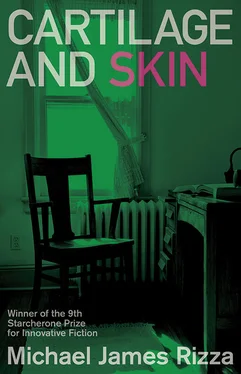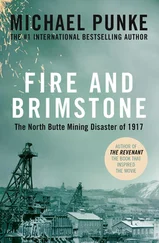II
A barebacked man stood in front of a full-length mirror on a closet door. He was middle-aged, with a big build that was covered with a layer of soft flesh. His hair was still wet from a shower, still uncombed. He stared at himself intently, almost as if he were waiting for, or perhaps daring, his own image to make a quick, unexpected gesture. He let his eyes inspect his body. He lowered his underwear down to his ankles and continued to stare at himself. After a moment, his piercing gaze and his rigid expression — as if his face had been carelessly hewn from wood — began to slacken, and his eyes became glazed, perhaps from staring too hard for too long. He touched himself, running his fingers gently across the spot where his testicles should have been. He exhaled audibly and, with abrupt deftness, pulled up his underwear and walked away from the mirror.
He dressed himself in a pair of black dungarees and a matching shirt and jacket; it was a uniform for a commercial refrigeration company. He seemed oblivious to his surroundings, moving by blind routine. The room was bright and clean, with knickknacks displayed on the dresser and pictures hung on the walls; his family smiled inside their frames. The man straightened the bedcovers and paused for a moment in the center of the hardwood floor. He seemed to be shutting down, turning into wood, his face drained of expression. This wasn’t struggle, but surrender and defeat. But then, as suddenly as a switch thrown on inside of him, he came alive again; he stuffed his hat into his back pocket and turned toward the door. However, instead of leaving, he strode over to a mahogany crib against the wall. He picked up a small blanket, unfolded it, refolded it, and then draped it over the side of the crib. He lifted his head and looked around as if he were only now realizing where he was. When he left the room, he had a faint smile on his face.
III
The clouds gathered thicker, darker, sustaining the mood of a bleak dawn for a while longer into the morning as the snow came down sideways, slanted by the wind, and as the wind whistled across the high, jagged terrain, stirring the evergreens and moving thin ripples across the surface of the river, which was nearly as unperturbed and implacable as the road, while the road itself now began to vanish under a fine coat of snow, as if nature not only conspired to blot out any indication of human handiwork but also to make the whole landscape so unwelcoming as to keep people away — but, nevertheless, a battered station-wagon drove slowly across the stout, dull green bridge and then stopped, with the snow glinting in the beams of its headlights and with one windshield wiper slapping furiously, in double-time to compensate for its partner, a useless blade that rested perpendicularly on the windshield, not moving at all. The car door swung open, and music, just a heavy, throbbing bass, spilled out of the car. A man emerged, with his chin pressed against his chest and his coat collar pulled high over his ears. He walked in front of the car, took hold of the dead windshield wiper with a gloveless hand, and began yanking on it, as if he wanted to rip it off or perhaps believed that this was how to make it work again. The other wiper slapped back and forth. The man cupped his hands before his face and blew on them. He had long fingers, and his face seemed as though his skin had been pulled tight over his skull. He had a small, crooked vein at his temple; high, hard cheekbones; and thin, bloodless lips. He was a tall man, dressed in a black pea coat and a pair of jeans. He cleared the snow off the windshield with his forearm. Muttering and visibly annoyed, he stared at the car. He walked back toward the open door and got in, shutting in the music as abruptly as he had released it. Although idling loudly, the station-wagon didn’t move, except for its single, furious wiper; snow already began to gather on the quiet side of the glass. The boy, as slight and absurd as a famished monkey, was standing in front of the car. When the car door opened a second time, the boy took a hesitant step backwards. He cautiously watched the vehicle, and as soon as the man made a gesture to get out, the boy turned and ran, limping because of the one missing sneaker. Running down the center of the road, he seemed crazy enough to try to outrun the car, as if he’d just challenged it to catch him and he didn’t think that it could. But the car made no attempt to pursue the boy. The man merely pulled the door shut and watched the boy through his windshield. About fifty yards ahead, the boy suddenly stopped running, walked over to the side of the road, and sat down with his back against the guardrail. Then the car began to inch itself forward, slowly, possibly afraid of startling the boy into fleeing again. When the car was beside the boy, the door opened and the man got out. The boy was hugging his knees, staring blankly at the man and the station-wagon. The man squatted and began to inspect the boy, the way he might inspect something he intended to buy, like a used lawnmower. He didn’t speak. Apparently satisfied, he raised the boy by the arms and helped him to the car, supporting him as though he were drunk or drugged.
IV
By afternoon, the snowstorm had traveled southward, and although most of its force was already spent, it had managed to foul up the roadways. On a suburban street, two boys trotted through one front yard and then the next, wandered onto the road, then through someone else’s yard. They talked loudly, having the calm, silent road all to themselves. At last, they stood before a yellow house whose lawn was cluttered with low, snow-covered shrubbery and scrappy trees. The boys walked up to the front door and rang the bell. They waited and rang again. After a while, they left the house, ducking under a fence and continuing on through peoples’ lawns. Their voices faded, soft and indistinct.
The snow fell faintly, lingering on, and by dusk, it was over. Because the road wasn’t plowed, cars had worn a single lane down the center of the road. A navy blue van, bearing the logo of a refrigeration company, approached the yellow house and pulled into its driveway. The man in the dungarees got out, slapped his hat against his thigh, and put it on his head. He walked down the driveway, his boots sinking into the snow, just above the ankle, with each step. The man took the mail out of the mailbox, and then started back toward the house. When he came to the front door, he paused for a moment with his keys in his hand; he was looking at the tracks the two boys had left in his yard.
A little while after the man had gone inside the house, the two boys returned, this time with shovels. They rang the bell, and the front light came on. The man opened the door. He was now wearing only the pants and a white tee-shirt. No sooner than he looked at the boys, he started closing the door.
“No thanks,” he said.
“What about Nathan?” one of the boys asked.
The man held the door still for a moment, so just his face was revealed.
“He’s not home.”
“When’s he coming back?”
“He’s away for the weekend, visiting his aunt.”
“Tell him Ray was looking for him,” the boy said. “He knows me from school; I’m a grade ahead of him.” Ray was wearing a florescent pink headband over his ears, which gathered his hair in a loose bunch at the top of his head. “Nathan’s not here,” Ray said to the other boy, even though he was standing there and listening himself. Without a word to the man, the two boys hoisted the shovels onto their shoulders and turned to leave.
“I’ll give you fifteen dollars,” the man said.
“We’ll do it for twenty,” Ray said.
“But you have to do the front walk also.”
For an answer, the boys merely lowered their shovels and started to clear the walkway.
Читать дальше












